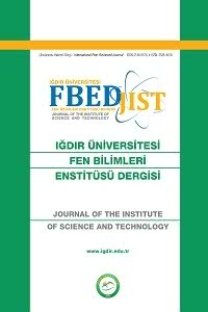Bioactivity of Hawthorn (Crataegus monogyna) and Heather (Calluna vulgaris) Leaf Tinctures: An Optimization Study Using Response Surface Methodology
Bioactivity of Hawthorn (Crataegus monogyna) and Heather (Calluna vulgaris) Leaf Tinctures: An Optimization Study Using Response Surface Methodology
In the current research, two medicinal important plants namely hawthorn (Crataegus monogyna) and heather (Calluna vulgaris) leaf were used for the tincture production according to central composite rotatable design and the produced tinctures were subjected to bioactive analysis to reveal the optimum manufacturing conditions. As response, total phenolic content and radical scavenging performance of the produced tinctures were analyzed. The levels of total phenolics and radical scavenging performance activity of the hawthorn and heather tinctures ranged between 2996.9-5415.8 mg GAE/L and 5514.9-13923.6 mg GAE/L and 26.9-71.9 and 51.0-94.1%, respectively. Effect of both liquid/solid ratio and ethanol concentration affected the bioactivity of the samples. Optimization process revealed that the optimum levels for the highest total phenolic content and antiradical activity were 4.03 mL/g for liquid/solid ratio and 67.07% for ethanol level for the hawthorn tincture and 4.03 mL/g for liquid/solid ratio and 53.77% for ethanol level for the heather tincture. The results of the current work revealed that the processing variables had important effect on the bioactivity of the tinctures.
Keywords:
tincture, bioactivity optimization,
___
- Akçura S. 2020. Optimum production conditions for the preparation of lemon balm (Melissa officinalis) tincture using response surface methodology. Biosystems Diversity, 28(2): 139-145.
- Bone K, 2003. A Clinical Guide To Blending Liquid Herbs: Herbal Formulations For The İndividual Patient. Elsevier Health Sciences.
- Cucu AA, Baci GM, Cucu AB, Dezsi Ş, Lujerdean C, Hegeduş IC, Bobiş O, Moise, AR, Dezmirean DS, 2022. Calluna vulgaris as a Valuable Source of Bioactive Compounds: Exploring Its Phytochemical Profile, Biological Activities and Apitherapeutic Potential Plants 11(15): 1993.
- Kaplan M, Yilmaz MM, Say R, Köprü S, Karaman K. 2020. Bioactive properties of hydroalcoholic extract from Origanum onites L. as affected by glycerol incorporation. Saudi Journal of Biological Sciences, 27(8): 1938-1946.
- Kaplan M, Yilmaz MM, Uslu R, Köprü S, Gözelle H, Muhderem, G. 2019. An optimization study for the production of Origanum onites tincture by response surface methodology: Effect of liquid/solid ratio, ethanol concentration and storage period. Tekirdağ Ziraat Fakültesi Dergisi, 16(1): 11-22.
- Koch E, Malek FA, 2011. Standardized Extracts From Hawthorn Leaves And Flowers İn The Treatment Of Cardiovascular Disorders–Preclinical And Clinical Studies. Planta Medica 77(11): 1123-1128.
- Koç B, Kaymak Ertekin F, 2010. Yanıt Yüzey Yöntemi Ve Gıda İşleme Uygulamaları. Gıda 35(1): 63-70.
- Köprü S, Say R, Karaman K, Yilmaz MM, Kaplan M. 2020. Optimization of Processing Parameters For The Preparation Of Clove (Syzygium Aromaticum) Hydroalcoholic Extract: A Response Surface Methodology Approach To Characterize The Biofunctional Performance. Journal of Applied Research on Medicinal and Aromatic Plants 16: 100236.
- Ma T, Wang QH, Wu H, 2010. Optimization Of Extraction Conditions For İmproving Solubility Of Peanut Protein Concentrates By Response Surface Methodology. LWT-Food Science and Technology 43(9): 1450-1455.
- Moreira T, Santos J, Costa ASG, Pinto D, Pimentel F, Oliveira AI, Rodrigues F, Beatriz M, Oliveira PP, 2016. Valorization of Calluna vulgaris (L.) Hull As A Potential Cosmetic İngredient: Characterization, Antioxidante Activity And Cell Viability Study. In Proceedings of the Livro de Atas do XIII Encontro de Química dos Alimentos, Porto, Portugal, 14–16 September 2016; pp. 39–42.
- Myers R, Montgomery DC, 2002. Response Surface Methodology: Process and Product Optimization Using Designed Experiments. 2nd Edition, John Wiley and Sons, New York, USA, 798 s.
- Olech M, Nowak R, Los R, Rzymowska J, Malm A, Chrusciel K, 2012. Biological Activity And Composition Of Teas And Tinctures Prepared From Rosa rugosa Thunb. Open Life Sciences 7(1): 172-182.
- Orhan I, Küpeli E, Terzioğlu S, Yesilada E, 2007. Bioassay-Guided İsolation Of Kaempferol-3-O-Β-D-Galactoside With Anti-İnflammatory And Antinociceptive Activity From The Aerial Part of Calluna vulgaris L. Journal of Ethnopharmacology, 114: 32–37.
- Seifried HE, Anderson DE, Fisher EI, Milner JA, 2007. A Review Of The İnteraction Among Dietary Antioxidants And Reactive Oxygen Species. The Journal of Nutritional Biochemistry 18(9): 567-579.
- Sheng ZL, Wan PF, Dong CL, Li YH, 2013. Optimization Of Total Flavonoids Content Extracted From Flos Populi Using Response Surface Methodology. Industrial Crops and Products, 43(1): 778-786. Vučić DM, Petković MR, Rodić-Grabovac BB, Stefanović OD, Vasić SM, Čomić LR, 2014. In Vitro Activity of Heather (Calluna vulgaris (l.) hull) Extracts on Selected Rrinary Tract Pathogens. Bosnian Journal of Basic Medical Sciences, 14: 234–238.
- Wadekar JB, Sawant RL, Patal UB,2015. Rheumatoid Arthritis And Herbal Drugs: A review. Journal of Phytopharmacy, 4: 311–318.
- Wang XS, Wu YF, Chen GY, Yue W, Liang QL, Wu QN, 2013. Optimization Of Ultrasound Assisted Extraction Of Phenolic Compounds From Sparganii Rhizoma With Response Surface Methodology. Ultrasonics Sonochemistry, 20(3): 846-854..
- ISSN: 2146-0574
- Yayın Aralığı: Yılda 4 Sayı
- Başlangıç: 2011
- Yayıncı: -
Sayıdaki Diğer Makaleler
Wharton Jel Kaynaklı Eksozom İzolasyonu: Metot Karşılaştırma Çalışması
Muhammed ULUCAN, Kürşat Esat ALYAMAÇ
Detection of Monkeypox Among Different Pox Diseases with Different Pre-Trained Deep Learning Models
Mustafa AKKAMIŞ, Sevgi ÇALIŞKAN
Enhancement of Strawberry Marmalade with Crab Apple (Malus floribunda) Anthocyanins
Ayca GÜLHAN, Hacer ÇOKLAR, Mehmet AKBULUT
Okan BAYRAM, Emel MORAL, Fethiye GÖDE
Kolon Kanserinde IL-6 Sitokinin Karbonik anhidraz III Gen İfadesi Üzerindeki Etkisinin İncelenmesi
Derya BABACAN, Sümeyye AYDOĞAN TÜRKOĞLU, Feray KÖÇKAR
AlMgTiB Alaşımının Yapısal, Isısal ve Mekanik Özelliklerinin İncelenmesi
